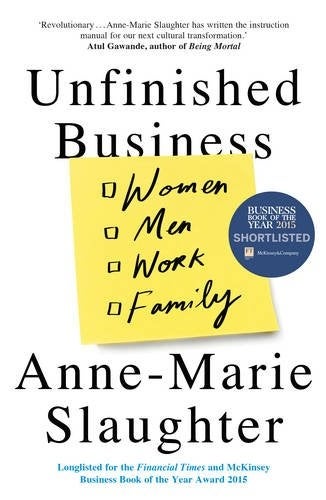Unfinished Business: Women Men Work Family, by Anne-Marie Slaughter - book review: Mind the care trap
Oneworld - £16.99

Any feminists thinking of moving to America and starting a family? Anne-Marie Slaughter’s manifesto for gender equality might change your mind. As Hillary Clinton’s former Director of Policy Planning demonstrates, without extreme wealth, American mothers can never be equal to male counterparts. With companies not obliged to provide paid maternity leave (the only nation besides Liberia and Papua New Guinea not to do so) or sick days, families are in crisis. The situation needs to change. How? By seriously re-evaluating our attitude towards care.
Care is the “crucible that can help reforge the sisterhood of the early feminist movement ... into a much broader human coalition”. Improvements in care, globally, would mean women no longer face discrimination for “dropping out” (a phrase Slaughter would outlaw) to have children or for demanding a flexible workplace.
Unfinished Business could easily be another irritatingly peppy self-help femifesto – think Sheryl Sandberg’s Lean In – but Slaughter’s refreshing self-awareness differentiates her. It follows her 2012 article for The Atlantic magazine, “Why Women Still Can’t Have It All”, which has since amassed almost three million views. Slaughter neatly summarises it in a charmingly frank foreword, albeit one occasionally infected with self-help jargon and LinkedIn phrases.
Cynics will find much to roll their eyes at: chapters called “Moving Beyond Our Mantras” and the gratingly ungrammatic “Getting to Equal”. The need to discard received assumptions is summarised as “Let It Go”, referring to the song from the Disney film Frozen. But this is a deeply contemporary book. With a quarter of British teachers planning to quit, and a crisis in NHS staffing, the care crisis hinders gender equality in the UK as much as in the US.
Unfortunately, the third section, in which Slaughter outlines a method to achieve change, rather falls apart. Patronising platitudes, so contrary to the casual style of the previous chapters, pepper it and such clichés don’t deserve a place in an otherwise engrossing, timely call for change for both women and men. Self-help books are typically marketed at female readers but it’s crucial that men read Unfinished Business, rather than hear a regurgitated summary. “We can’t ask men to be equal on our terms”, writes Slaughter. But we can ask that they help finish this business of gender equality.
Subscribe to Independent Premium to bookmark this article
Want to bookmark your favourite articles and stories to read or reference later? Start your Independent Premium subscription today.

Join our commenting forum
Join thought-provoking conversations, follow other Independent readers and see their replies